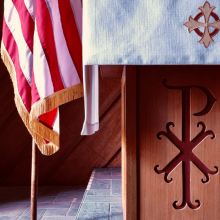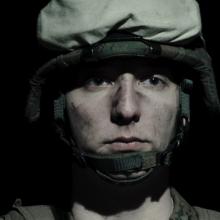denial
In the immediate aftermath of Jan. 6, 2021, I naively believed that the violent attempt to overturn the 2020 election outcome would serve as a breaking point for the nation and the Republican Party. Despite the party’s anti-democratic slide, including so many embracing the lie that the 2020 election was stolen, I thought the collective horror of the day — felt across the political spectrum — would awaken everyone to the danger that former President Donald Trump and his enablers posed to our democracy. Of course, we now know that isn't what happened.
Yet, in this charged atmosphere, Jesus calls us to be peacemakers — regardless of our political leanings or party affiliation. So, what does peacemaking look like during the upcoming midterms?
In Keeping Faith, philosopher Cornel West explains that our investment of “existential capital” in the nation-state leaves us with “a profound, even gut-level, commitment to some of the illusions of the present epoch.” We experience amnesia when we allow our nation’s myths to be the foundation of our current reality.
I WAS PRESENT when my uncle died. I didn’t plan to be, but once I understood his end was near it felt right. I had been the flower girl at my aunt and uncle’s wedding, the ritualized beginning of their life together, so witnessing this milestone event of my uncle’s death seemed appropriate. And I wanted to support my aunt, I told myself.
My aunt is my father’s youngest sister. They are the last living siblings from nine brothers and sisters; both their parents are also long gone. My aunt wears this fact like a veil. Sometimes it’s barely noticeable; sometimes it’s the only thing she sees. While my parents’ divorce had kept me apart from my aunt for much of my life, it seemed important, the fury of those old family dramas now covered with dust, to offer my aunt support in her husband’s last days, hours, then moments. She was hardly alone. My aunt has three grown daughters, and my uncle comes from a huge family, most of whom were packed into the hospital room where he died at 2:20 p.m. on Sept. 22, 2013.
My aunt told me she was happy to have me, a representative from her side of her family, present. So I was there. For her, I said.
But to tell the truth, I was there to learn. I have plenty of information about the beginning of life. People in my generation received hours of tutoring, lecturing, indoctrinating, and warning about puberty, childbirth, birth control, and “safe sex.” Although we were actually not given much information about sexuality—I had to learn that on my own. But I knew even less about death.
OUR HISTORY IS increasingly hostage to a deep and broad ecological crisis. Stalking us for centuries, it is now upon us in the interlocking catastrophes of climate destruction, habitat degradation, species extinction, and resource exhaustion. Some call it “peak everything.”
“All we have to do to destroy the planet’s climate and biota and leave a ruined world to our children and grandchildren,” concluded environmental policy analyst James Gustave Speth in The Bridge at the Edge of the World, “is to keep doing exactly what we are doing today ... to release greenhouse gases ... impoverish ecosystems and release toxic chemicals at current rates, and the world in the latter part of this century won’t be fit to live in.”
Our Christian faith and practice now unfold either in light of or in spite of this crisis. Our choice is between discipleship and denial.
Two trends among thoughtful Catholics, evangelicals, and other Protestants in North America over the last quarter century are helping awaken us to “response-ability” in the face of these inconvenient truths. One is the spread of contextual theology, which demands both analysis and engagement with social realities around us. The other is how “creation care” has gained broad traction among churches.
But these trends need to be integrated. Contextual approaches have tended to address social, economic, and political issues apart from ecological ones. And environmental theologies are not contextual enough: often too abstract (debating “new cosmologies”), focused on remote symptoms (tropical rain forests or polar ice caps), or merely cosmetic (“greening” congregations through light bulb changes while avoiding controversies such as the Keystone XL pipeline).
Our “all hands on deck” moment requires a practical approach that challenges and equips our churches to learn how to “serve and preserve” the earth (Genesis 2:15). The best way to do that is to focus on the particular places in which we dwell.
Where do we go from here?
From the denial of racism to the naming and facing of racism.
If we are to move forward, we must acknowledge that racism is alive and well in the American psyche. It continues to function as a demonic force with devastating consequences for us all. To be white in America is to benefit from a system of power and privilege whether or not one has ever uttered a racist thought or committed a racist act.
The most precious place on Earth for me is a camp on a lake in the Adirondack Mountains of New York. During the next century, climate change will chase northward things that I cherish. Spruce, tamaracks, sugar maples, balsam fir, moose, mink, and loons will no longer grace the shores and waters of that lake. Like most people in northern climes, I see the changes happening already. I have to fight hard against despair, for my personal losses, yes, but also for the universality and injustice of the calamity, which already affects so many of the poor and innocent.
WHY IS IT so hard for people to respond effectively to the reality of climate change?
Changing people’s minds—with facts, tables, and predictions—has proven extremely difficult. Even showing people the miraculous beauty of the planet alongside the predicted losses is not working. Guilt, anxiety, and anger can be motivating forces, but they have debilitating side effects: They are all soul-destroying.
So I wonder about our hearts. Have we ignored our emotional and spiritual connections to the planet? Could the noise swirling around climate change—science, politics, media blitzes, as well as the weather disasters themselves—drown out the voice of a loss so profound that it rests unnamed in our souls? Could our breaking hearts be part of the reason we are immobilized?
In the 1960s, Rachel Carson’s image of a “silent spring” due to the proliferation of pesticides was as heartrending as it was controversial. Carson was ridiculed, her predictions dismissed. The corporate world paid millions to have her silenced. But eventually the love of bird songs won out. People read Carson’s book, grieved at the prospect of a silent spring, spoke up, and insisted the chemical-company-supported politicians ban DDT.
My Uncle Norman fought in Europe during World War II. An artillery observer, he didn’t return with many “heroic” stories to tell. When I was little, he would roll out some souvenirs from the war, and I’d be impressed: German military dress knives and lovely table linens. I don’t recall all of the stories or how these things became his, but I’m pleased to report the table linens were a gift. His war experience was hardly glamorous.
Uncle Norman did tell of one harrowing experience. He and his partner were identified by German artillery, and they experienced exactly the treatment they dished out. Out in front of their own unit, as they always were, they heard a shot go just overhead and explode behind them. Then one fell just short. Placing a shell a bit to the left and one to the right, the Germans had them zeroed in. Uncle Norman’s friend panicked, frozen, stuck to the ground. And in the last minute – as he remembered it – my uncle tackled his partner and carried him to safety. Pretty dramatic stuff for a kid to hear.
When Uncle Norman was much older, he came close to death after gall bladder surgery. That night he experienced profound nightmares, the Lady Macbeth experience of bloody hands he could not cleanse. The next day, he told me a very different story than the ones I’d heard before. I believe I was the first to hear of the time when he called in the coordinates for an intersection across which a significant body of Germans was crossing. For 30 minutes, he said, he watched the effects of the barrage he had targeted. And now, 40 years later, his hands wouldn’t come clean.




